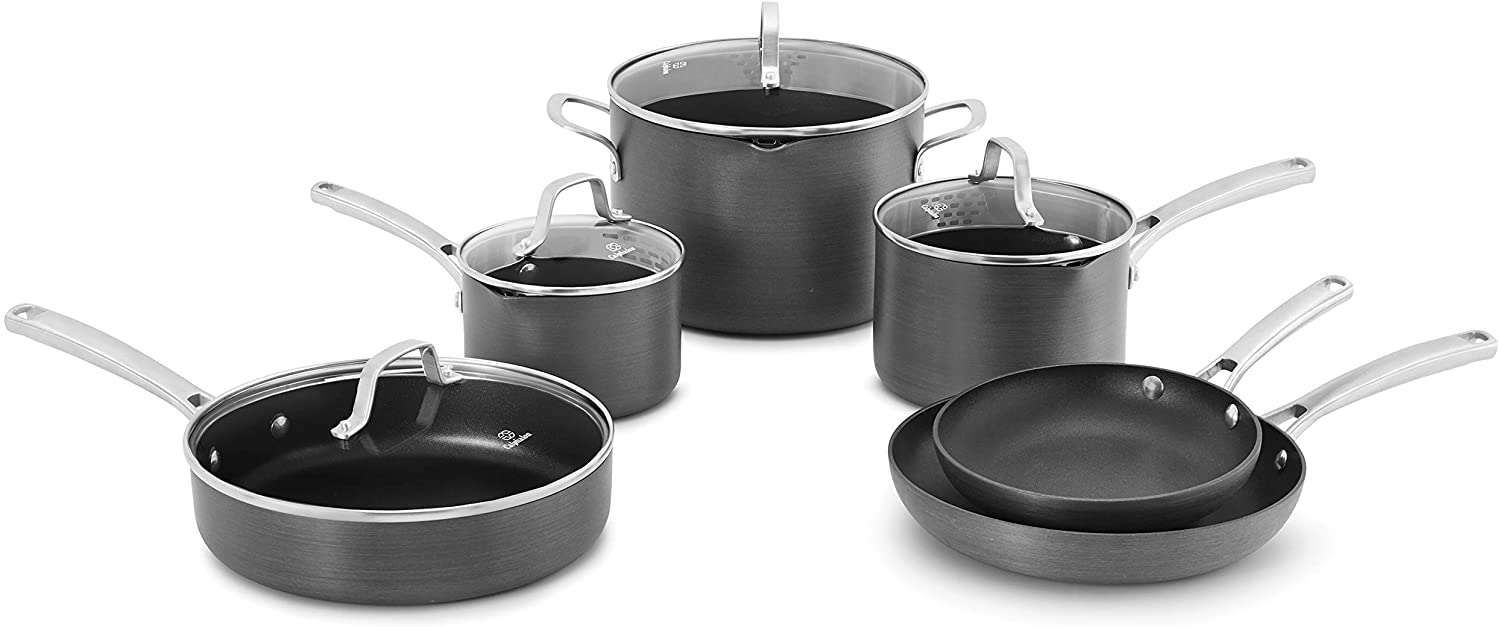When you hear the term “hard-anodized” cookware, you’re talking about hard-anodized aluminum cookware. For decades, brands such as Calphalon and Anolon have bragged about their superior durability and heating properties.
The aluminum in hard-anodized cookware has been treated to make it stronger and more durable. This is accomplished by immersing the aluminum in a chemical bath and exposing it to a strong electrical current.
This process generates oxide, the compound that causes rust. In addition, the oxide hardens the aluminum surface, making it far more resilient and resistant to future corrosion. Although hard-anodized cookware is frequently thought to be distinct from nonstick cookware, almost all hard-anodized options are also nonstick.
When you see hard-anodized cookware, know that the base is hard-anodized aluminum. Still, the surface is coated with nonstick material.
Hard-anodized cookware did not have a nonstick coating when it was first introduced decades ago. However, when nonstick cookware became popular in the 1990s, cookware manufacturers began coating most hard-anodized cookware with a nonstick coating.
Is Hard Anodized Cookware Scratch Proof?
Because aluminum is lightweight and has excellent heat conductivity, it is commonly used in bakeware and cookware. On the other hand, aluminum corrodes in the presence of acidic foods, resulting in darkened spots on foods with light coloring. In most modern aluminum pans, a ceramic layer or “anodized” is applied to prevent this.
The anodized layer is created within the metal molecules rather than applied to the surface, making this process unique. As a result, the anodized protective layer will not chip or peel off. It will wear down over time, but if properly cared for, it will outlast applied coatings. In addition, hard-anodized aluminum is naturally stick-resistant, as well as scratch- and odor-resistant.
Because the hard-anodized layer is not a coating, a hard-anodized pan can be used with any utensil. However, nonstick coatings are frequently applied to hard-anodized cookware, so we recommend double-checking the manufacturer’s instructions before using metal utensils. In addition, metal utensils can scratch single- or double-layer nonstick coatings.
Benefits and disadvantages
You should be able to use any utensil in a hard-anodized pan without fear of scratching it. It does not have an utterly nonstick surface, despite having a smooth surface that should reduce sticking. Some food may adhere to the surface, making cleaning difficult. You should use this type of cookware for liquids and movable foods. If you must clean it, use regular dish soap or a gentle scrub brush to remove debris gently. Harsh cleaning products and steel wool materials should be avoided at all costs.
When Should You Throw Out Hard Anodized Cookware?
Anodized aluminum has a broad array of applications in consumer goods and industrial building materials. Moreover, because of the oxide’s porous nature, color can be applied to it. So before you throw out your cookware, look for these tell-tale signs that it’s time to replace it.
Warping isn’t always dangerous, but it can mean that your food won’t be as good as it could be. When a pan is contorted, the cooking surface becomes uneven, and the food does not cook evenly. To ensure that all of your food is cooked at the same temperature and is safe to eat, you may want to play it safe and discard the warped pans.
Not all discoloration is terrible; it is caused by the accumulation of food over time. The slight discoloration isn’t a big deal, but it could indicate that the nonstick coating has been damaged when it becomes dark. It’s time to replace the pan at that point.
Scratches are a deal-breaker—especially in older pans. Scratches indicate that the nonstick surface has been compromised, and chemicals may be flaking off into your food. Once a pan has been scratched, it must be discarded for the sake of safety.
They should be changed every five years as a general rule of thumb. After that, you should inspect your pans regularly. As soon as they become warped, discolored, or scratched, stop using them immediately.
Is Hard Anodized Cookware Bad for You?
Yes, hard anodized cookware is safe, in a nutshell. There are, however, some precautions you must take to ensure its safety.
Hard anodized aluminum is not reactive, whereas plain aluminum is. Therefore, after the electrolytic passivation is complete, a thick layer of aluminum oxide forms is inert. This layer protects your food from contact with the plain aluminum base.
Because hard anodized cookware is not reactive, you can safely cook acidic ingredients like tomato sauce in it without fear of the color or flavor changing.
Does it leach aluminum?
The aluminum oxide layer protects both your food and the reactive aluminum base, keeping it safe from the aluminum base. Because the layer with which your food comes into contact is non-reactive. When cooked with acidic ingredients, it will not leach aluminum into the food you eat. As with seasoning cast iron pans, seasoning your food will help create a protective layer that will keep iron from contaminating your food.
Is using aluminum cookware safe?
Several factors influence the amount of aluminum in your food. Acidic foods, such as tomato sauce and lemon juice accelerate leaching. Storing cooked food in aluminum cookware can increase the amount of aluminum leached.
Health risks
According to some experts, cooking with anodized aluminum may pose some health risks. Although it is less likely to corrode, users are often hesitant to use it out of fear that it will be harmful. There is, however, no conclusive scientific evidence that it is hazardous.
Patients with chronic renal failure are unable to eliminate ingested aluminum from their bodies effectively. It accumulates over time. It may also cause aluminum poisoning. To be safe, avoid using hard anodized cookware if you have or are cooking for someone who has kidney disease.
The main picture is from Amazon – Calphalon Store. As an Amazon Associate I earn from qualifying purchases.

